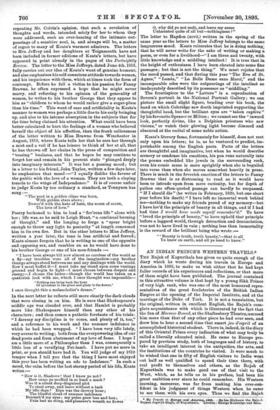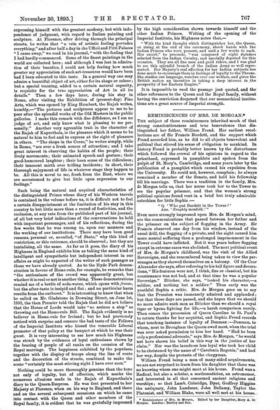AN INDIAN PRINCE'S WESTERN TRAVELS.* THE Rajah of Kapurthala has
given us quite enough of the diary which he wrote during his travels in Europe and America in 1893, to make us wish either that he had kept fuller records of his experiences and reflections, or that more of them might have been published. The journal contained in this attractive volume is that kept by a young Sikh Prince of very high rank, who was one of the most honoured repre- sentatives of the great feudatories of the British Indian Empire at the opening of the Imperial Institute, and at the marriage of the Duke of York. It is not a translation, but the original, written in excellent English, the Rajah's com- plete acquaintance with which is illustrated by the fact that the fun of Morocco Bound, at the Shaftesbury Theatre,.amused him more than that of any other piece he had ever seen, and drew him to hear a second time that smart jeu d'esprit of an accomplished historical student. There is, indeed, in the diary of this Oriental Prince every indication of what may truly be called a liberally educated mind. He came to Europe pre- pared by previous study, both of languages and of history, to take an intelligent interest in the antiquities, the arts, and the institutions of the countries he visited. It were much to be wished that one in fifty of English visitors to India went out half as well qualified to spend their time there, with real profit to themselves and others, as the Rajah of Kapurthala was to make good use of that visit to the West, which, as he tells us in his preface, had been his great ambition ever since he could remember. His Western learning, moreover, was far from making him over-con- fident in his judgment of things Western when he came to see them with his own eyes. Thus we find the Rajah • My Travels in -Europe gad Aqa•rie,a, - HyJiiallighness the Raja-I- Itajgan Jagatjit Singh, of Eaparthals. London: George Houtleclge and Sons.
expressing himself with the greatest modesty, but with inde- pendence of judgment, with regard to Italian painting and sculpture. At Florence, after driving through the principal streets, he writes that "a vein of artistic feeling pervades everything," and after half a day in the Uffizii and Pitti Palaces "I came away," we read in his journal, " with the feeling that I had hardly commenced. Some of the finest paintings in the world are collected here ; and although I was lost in admira- tion of their beauties, I could not help feeling how much greater my appreciation of such art-treasures would have been had I been educated to this taste. In a general way one may admire a beautiful object of art, either for its shape or colour ; but a special training, added to a certain natural capacity, is requisite for the true appreciation of Art in all its details." Then a few days later, during his stay in Rome, after visiting the Exhibition of (present-day) Fine Arts, which was opened by King Humbert, the Rajah writes, humbly,—" The pictures and sculptures appear to me to be poor after the splendid works of the Old Masters in the public galleries. I make this remark with due diffidence, as I am no judge of art, and only know what is pleasing to me per- sonally." Another very agreeable trait in the character of the Rajah of Kapurthala, is the pleasure which it seems to be natural to him to feel and to express at the sight of pleasure in others. "The shops in the Corso," he writes simply, while in Rome, "are ever a fresh source of attraction ; and I take great interest in observing the habits of the people; their lively movements ; their animated speech and gesture ; their good-humoured laughter ; their keen sense of the ridiculous ; their innocent mirth over trifling incidents ; in short, their thorough enjoyment of life in whatever stage they happen to be. All this is novel to me, fresh from the East, where we are accustomed to give but little open expression to our feelings."
Such being the natural and acquired characteristics of the distinguished Prince whose diary of his Western travels is contained in the volume before us, it is difficult not to feel a certain disappointment at the limitation of his stay in this country to but little more than a round of festivities, and the exclusion, at any rate from the published part of his journal, of all but very brief indications of the conversations he held with important personages, and of his reflections, during the few weeks that he was among us, upon our manners and the working of our institutions. There may have been good reasons, personal or, so-called, "of State," why this kind of restriction, or this reticence, should be observed ; but they are tantalising, all the same. As far as it goes, the diary of his Highness in England exhibits him as taking the same kind of intelligent and sympathetic but independent interest in our affairs as might be expected of the writer of such passages as those we have already quoted. As to the Hyde Park demon- stration in favour of Home-rule, for example, he remarks that "the enthusiasm of the crowd was apparently great, but whether it is real or not is another thing. These demonstrations remind me of a bottle of soda-water, which opens with fracas, but the after-taste is insipid and flat ; and no particular harm results from the outburst." It is interesting to know that when he called on Mr. Gladstone in Downing Street, on June 1st, 1893, the then Premier told the Rajah that be did not believe that the House of Lords would take "so serious a step" as throwing out the Home-rule Bill. The Rajah evidently is no believer in Home-rule for Ireland ; but he had previously noticed with surprise and censure the bad taste of the Fellows of the Imperial Institute who hissed the venerable Liberal promoter of that policy at the banquet at which he was their guest. It is very interesting to see how much his Highness was struck by the evidences of loyal enthusiasm shown by the bearing of people of all ranks on the occasion of the Royal marriage. The happiness exhibited by the populace, together with the display of troops along the line of route and the decoration of the streets, combined to make the scene "certainly the most stirring sight I have ever seen."
Nothing could be more thoroughly genuine than the tone not only of loyalty, but of affection, which marks the numerous allusions made in the Rajah of Kapurthala's diary to the Queen-Empress. He was first presented to her Majesty at Florence, when on his way to England, and there and on the several subsequent occasions on which he came into contact with the Queen and other members of the Royal family, it is evident that be was gratefully impressed by the high consideration shown towards himself and the other Indian Princes. Writing of the opening of the Imperial Institute, his Highness notes that,—
" With the kind thought which distinguishes her, the Queen, on rising at the end of the ceremony, shook hands with the Indian Princes who were present, and said a few words to each. Her escort," he proceeds, "was composed of eight dafadars selected from the Indian Cavalry, and specially deputed for this occasion. They are all fine men and good riders, and I was glad to see this splendid branch of the Indian Army so well repre- sented. Her Majesty's real affection for her Indian subjects has done much to encourage them in feelings of loyalty to the Throne. She studies our language, watches over our welfare, and gives the British nation an incentive in taking a deep interest in the prosperity of her Eastern Empire."
It is impossible to read the passage just quoted, and the other references to the Queen and the Royal family, without having the conviction deepened that our monarchical institu- tions are a great source of Imperial strength.











































 Previous page
Previous page